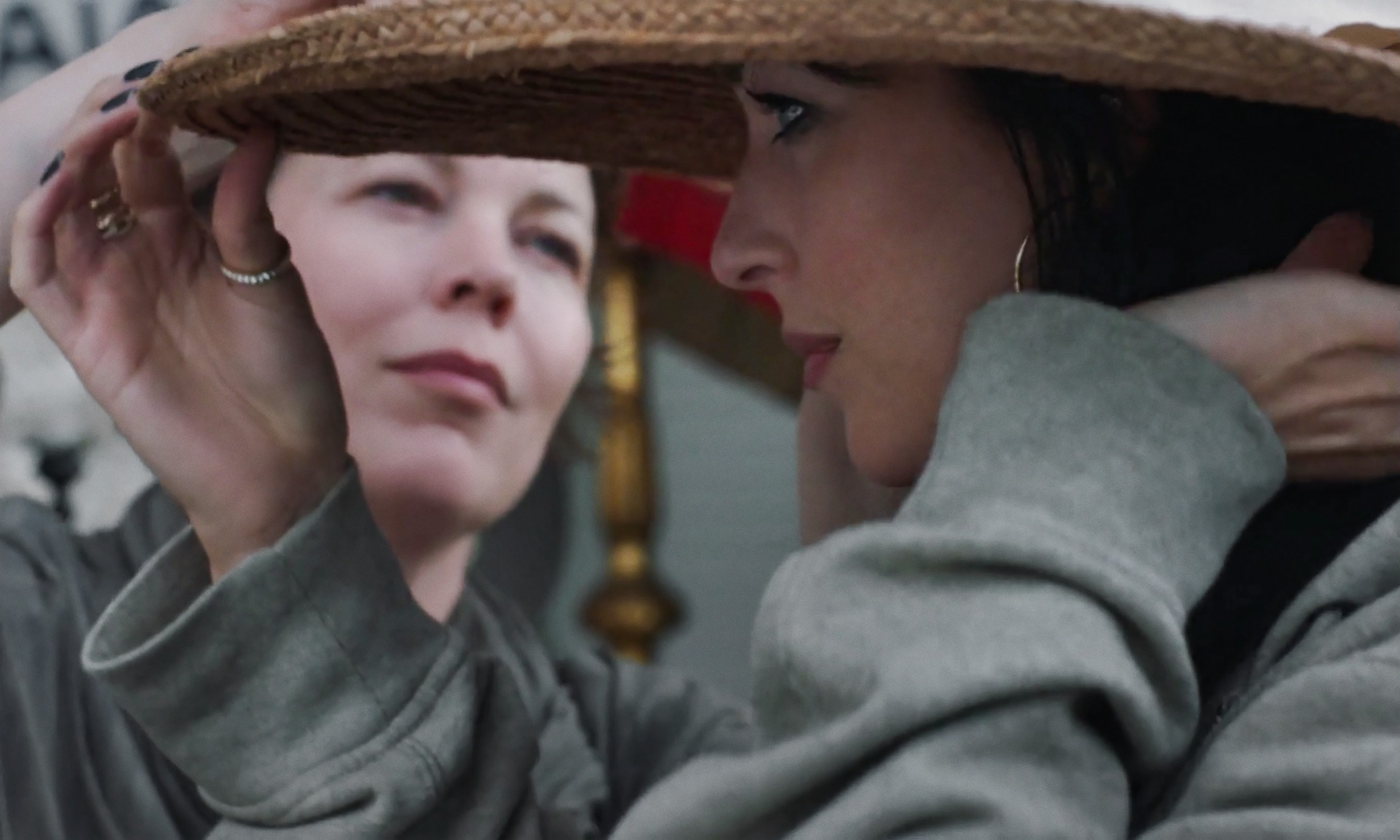
Elena Ferrante’s The Neapolitan Quartet – an epic tale of female friendship and rivalry told over six decades – is easily her most famous work. By the time the final volume had been published in English in 2015, the quartet had become an international bestseller, sparking what we now know as “Ferrante Fever”. However, it was her first three novels, Ferrante has suggested, that allowed her the “creative space” to write the quartet. She sees them as “part of a chain” that deal with similar themes and concerns.
This should give Ferrante fans, as well as those discovering her work, more reason to watch The Lost Daughter, a film version of the last of those formative three novels, due for release in January. Adapted and directed by Maggie Gyllenhaal, the film features a star-studded female cast, including Jessie Buckley, Olivia Colman and Dakota Johnson. Ferrante has taken a hands-off approach to the adaptation, in keeping with the fact that she has famously kept her true identity hidden. In a letter to her publisher in 2016, affirming this stance, she wrote: “I believe that books, once they are written, have no need of their authors. If they have something to say, they will sooner or later find readers; if not, they won’t.”
However, she did make one crucial intervention. When Gyllenhaal, a seasoned actor, wrote to Ferrante asking for permission to adapt The Lost Daughter, the author agreed, but on one intriguing condition: Gyllenhaal had to direct it herself or the contract was “null and void”.
Mothers, daughters and dolls
Mothers and daughters are a recurrent theme in Ferrante’s work and none more so than The Lost Daughter (originally published in 2006 as La figlia oscura), a book about a woman who abandons her children. In Gyllenhaal’s compelling adaptation, the protagonist, Leda Caruso (Colman), a professor of literature and a specialist in Italian translation, is on holiday alone on a Greek island. Leda is divorced; her grown-up daughters live with their father. On the beach she encounters a large, loud and uncouth American family. Leda becomes fascinated with one family member, Nina (Johnson), a beautiful young woman, and her daughter Elena (Athena Martin).
The book and film follow similar trajectories. Leda envies Nina’s close relationship with her daughter and her apparent maternal serenity. The child reflects her mother’s love in her attachment to her doll, named Nani, “from whom the child was never parted and to whom Nina paid attention as if she were alive, a second daughter”. But then Elena goes missing on the beach and there is uproar. Leda recalls her own panic when one of her own daughters was lost, but reassures Nina, “She’s wearing your hat… She’ll be found, we’ll see her easily.” Leda is applauded when she finds the girl. However, as we soon discover, she has stolen Elena’s abandoned doll: a senseless, some would say cruel, act that even Leda doesn’t truly comprehend. As she comments at the beginning of the novel: “The hardest things to talk about are the ones we ourselves can’t understand.”
Of the book, Gyllenhaal commented at the New Yorker Festival in 2018: “I have never heard these things articulated before. There was one point where I was like, this woman is so fucked up, and then I was like, I totally relate to her.” In an interview with the New York Times in 2014, Ferrante refers to it as “the most daring, the most risk-taking” of all her early novels, with themes that troubled her the most, claiming: “If I hadn’t gone through that, with great anxiety, I wouldn’t have written My Brilliant Friend [the first volume of her Neapolitan quartet].” A year later, she told the Flemish paper De Standaard: “It cost me a lot to write… [and] left me feeling the way you do when you swim until you’re exhausted and then you realise you’ve gone too far from the shore.”
It’s easy to see Ferrante’s first two novels as part of a chain leading to the third. In her debut, L’amore molesto (1992), translated into English as Troubling Love in 2006, Delia is obsessed with her mother Amalia’s beauty. After learning that she has drowned, Delia travels home to Naples for the funeral and attempts to piece together the details surrounding her mysterious death. In doing so she is forced to confront her own troubling childhood memories. In I giorni dell’abbandono (2002), translated as Days of Abandonment in 2005 and made into a film the same year by Roberto Faenza, Olga has a breakdown after her husband leaves her for a younger woman. She neglects her children, but her young daughter’s presence helps bring her back from the brink.
The Lost Daughter also points to the quartet to come. For Leda, it is a lost doll that precipitates her emotional crisis. A similar motif occurs in My Brilliant Friend – at the start of the novel, childhood friends Lila and Lenù throw each other’s dolls into the cellar of an apartment owned by Don Achille Carracci, “the ogre of fairy tales”. Ferrante went on to write a children’s novel, La spiaggia di notte (The Beach at Night), narrated by the doll from The Lost Daughter.
Ferrante's 'fragmenting' characters
Much of the drama in the book and film comes from the question of whether Leda will keep the doll or give it back. The child, Elena, is distraught by the loss, but instead of returning the doll, Leda buys it new clothes from the local toy shop. Her transgression provokes recollections of her own childhood doll, Mina, that she had given to her eldest daughter. This leads to a deluge of memories where we learn Leda abandoned her children so she could pursue academic success and a passionate love affair with the charismatic Professor Hardy (Peter Sarsgaard). In the novel, Leda recalls all her bad mothering moments – when she had shouted at her children, slammed a door shut on one of them, or thrown the doll out of the window. Gyllenhaal is kinder and shows young Leda (Buckley) in a series of flashbacks as a loving mother, genuinely torn between her work and her children.
In a 2007 interview with the Italian press, Ferrante claims that Leda “sought an emancipation and confrontation on equal terms with the male world”. She had wanted both children and a career. Gyllenhaal’s adaptation explores this decision with understanding and grace. Ferrante’s novel is darker – accenting a mean, selfish streak in Leda followed by a crushing guilt that haunts her. One can convey a character’s emotional scars, their hidden thoughts, what Ferrante has called their “fragmentation”, more easily in a novel than a film. Perhaps inevitably, then, both Gyllenhaal’s The Lost Daughter and Faenza’s Days of Abandonment soften the darkness at the heart of the novels, along with the obsessive nature and intensity of the female protagonists, making the characters more sympathetic for a film audience.
The apparent ease with which Gyllenhaal has adapted the novel for a mainstream audience is an indication of the authenticity of Ferrante’s text – something she always strives for. One of the reasons her fiction translates so well onto screen is because she shows, rather than tells, difficult emotions. Part of the pleasure of The Lost Daughter, in both forms, is the honesty with which the female protagonist is drawn and, in the film, the beauty with which Colman conveys it: a nuanced portrait of a middle-aged woman – flawed, prickly, sympathetic. As Ferrante observed in a Vanity Fair interview in 2015: “Honest writing forces itself to find words for those parts of our experience that are hidden and silent.” It is this ability to express the complexity of women’s feelings – as children, mothers and friends – how they function in a patriarchal society and cope with obstacles including isolation and abandonment, that gives Ferrante’s work its enduring appeal. Gyllenhaal’s film is a bold, textured exploration of motherhood with a refreshing lack of sentimentality that will undoubtedly win Ferrante new fans.
This piece is a preview from the Witness section of New Humanist winter 2021. Subscribe today.

